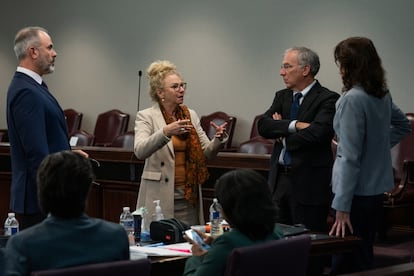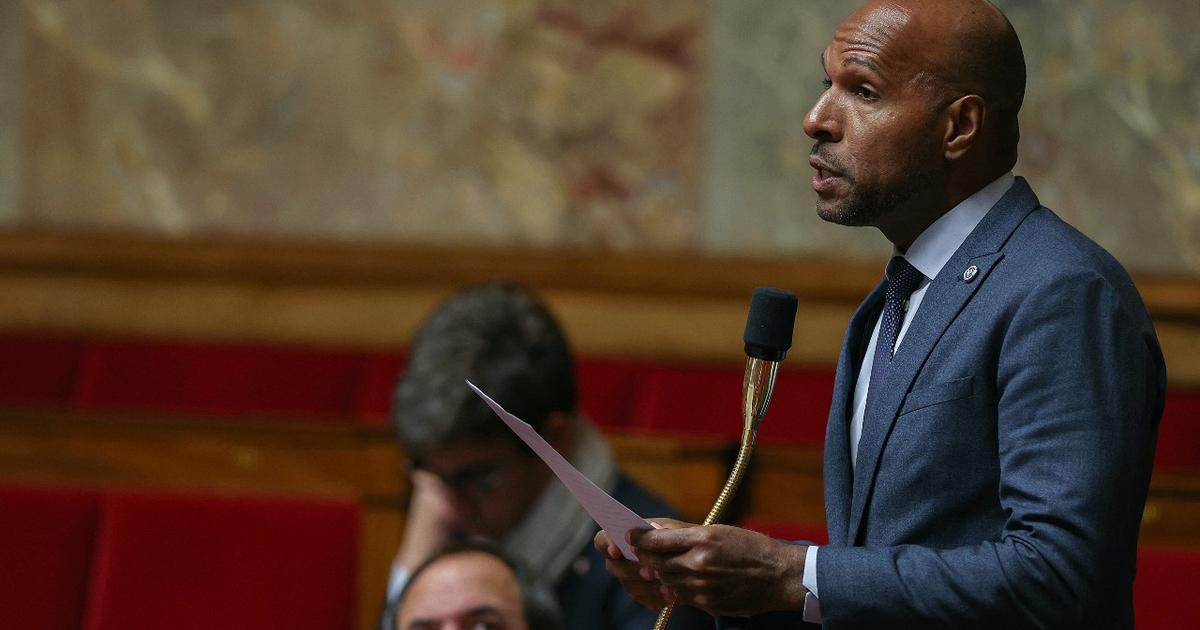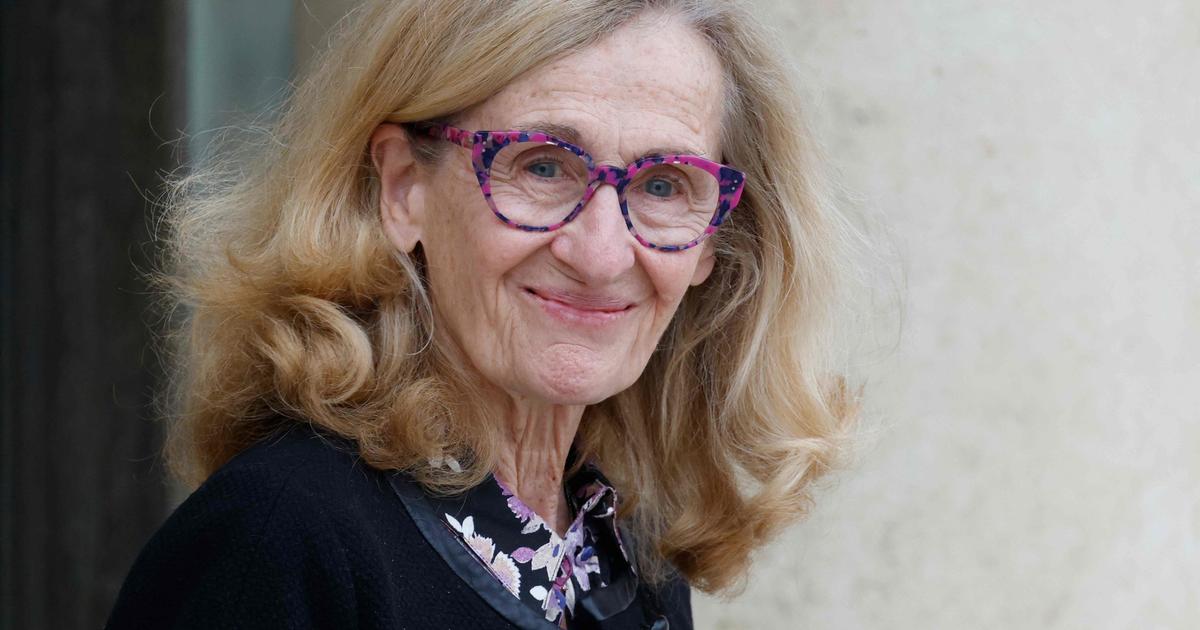Defense attorneys in the Ahmaud Arbery murder case speak with prosecutor Linda Dunikoski during the jury selection for the trial of the men charged with the Arbery murder in Brunswick, Georgia Elijah Nouvelage (Getty Images)
The jury that decided last November the fate of the three white men accused of killing Ahmaud Arbery, a 25-year-old African-American who had left home to run and was unarmed, on February 23, 2020, consisted of 11 white members and a black one. The defendants' attorneys rejected 11 of 12 potential African-American jurors in a Georgia state county where approximately 25% of residents are black. The recent Arbey trial case is a reflection of how the majority of jurors selected to participate in court hearings in the United States are white, regardless of whether the racial makeup of the trial site population is diverse.
Although the three men were convicted of multiple charges and face life in prison, the process reopened a debate and a problem that academics have long been warning about: African Americans are underrepresented on court juries.
One of the main factors that allows racial discrimination in the selection of jurors is what is known as peremptory defiance, a practice that allows prosecutors and defense attorneys to reject about 15 jury candidates per process - the number varies by the State - without having to justify why they do not want them to participate. When options are exhausted, they can file unlimited challenges, but must plead cause for it. These usually range from when the potential jury has a relative in prison until he looks like a drug dealer. Few blacks pass both screens.
Now, a handful of progressive states like Washington and California have put in place measures to avoid it and seek to tighten the requirements so that a potential jury can be dismissed and thus curb the discriminatory system.
The lawyer Elisabeth Semel, who heads a department at the University of Berkeley (California) that represents those sentenced to the death penalty and conducts studies on the subject, has analyzed nearly 700 cases that reached the appeals courts after controversial peremptory challenges between 2006 and 2018. The study, titled Whitewashing the jury box, revealed that prosecutors used this option to eliminate potential black jurors in 72% of cases, 28% in Latinos, and 0.5% in whites.
“This is very much connected to the very sad and ugly history of the United States and racism. It is part of our present as much as of our past ”, explains Semel by phone. Among the reasons you have heard for dismissing a potential juror are that the candidate is male and wears earrings or sports an Afro hair. The judges, who are the ones who have the last word to accept or not the blockade, usually consider them valid, according to the lawyer.
In addition to the rules for screening candidates on selection tests, William Snowden, founder of the Juror Project, an educational organization on racial discrimination in jury selection, notes that another factor that disadvantages African Americans is the fact that Courts use voter registration lists and driver's license lists to send out summons to potential jurors. Ronlad Wright, a criminal law expert at Wake Forest School, explains it this way: "Poor people, and in America that means they are not white, they are excluded more often than others" from the proceedings.
In addition, a racially diverse jury spends more time deliberating, Wright notes, which a priori means they are more careful, and, based on different studies, are more likely to be more accurate in their understanding of the facts, as well as better reflect opinions. community generals.
Racial discrimination in jury selection has occurred since blacks won their first civil rights. The Supreme Court did not rule on the issue until 1986, when it ruled that peremptory challenges cannot be used to exclude jurors based solely on ethnicity. That ruling in Batson v. Kentucky led to the practice being challenged on the grounds that it failed to meet acceptable criteria in court. But "all the studies that have been carried out during the last decades have shown that this is not an effective way to reduce discrimination," argues Semel, who remarks that the "Batson challenge" requires demonstrating that the blocking of a candidate was based on intentional discrimination, and it is difficult for judges to accuse a prosecutor of being “racist”.
Thurgood Marshall, the first black Supreme Court judge, supported Batson's ruling against Kentucky, but has already advanced that racial discrimination in jury selection was not going to end as long as the possibility of rejecting candidates without alleging motive was eliminated. . The UK lifted the so-called peremptory challenge in 1988 and Canada in 2019. Last September, Arizona became the first US state to ban them.
In order to reinforce the line marked by the Supreme Court's ruling, the Superior Court of the State of Washington adopted in 2017 a rule that makes it easier for lawyers to challenge the peremptory challenge without having to prove that there was an intention to discriminate on the part of prosecutors or lawyers defenders.
William Snowden, who worked as a defense attorney in New Orleans, recalls that prosecutors used to ask prospective jurors if they had a bad experience with the police, and most of those raising their hands were Black or Latino.
They were then eliminated for perceiving prejudices against the agents.
"Prosecutors can no longer use that response as a reason to remove a candidate" from the list in Washington, explains Snowden, "or their concerns or criticism of the criminal system."
Strengthen control
On January 1, a California law similar to Washington's went into effect. The regulations allow the court to object to a peremptory challenge and ask for explanations and evaluate the reasons in order to eliminate possible racial biases. Courts in Connecticut, New Jersey, Iowa, and the District of Columbia are considering similar measures. Snowden believes that peremptory challenges should be maintained, but that what needs to be done is "increase and provide protection against discrimination at the state level" with control measures. Along the same lines, Semel, who has worked on California reform, believes that states should follow that path and reinforce the demand for arguments to reject juries.
Professor Wright believes that the "experiment" in Arizona may shed light on whether or not it is effective in a couple of years, but he does not believe that most states will follow suit for 20-30 years.
He is hopeful that in the short term the Public Prosecutor's Offices and public defenders will begin to track their own data on the selection of jurors and make them public to raise awareness about discrimination in the jury system and generate social pressure to take action.
Follow all the international information on
and
, or in
our weekly newsletter
.









